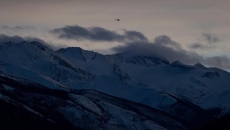As COVID-19 vaccine supplies gradually ramp up across the country, most provinces and territories have released details of who can expect to receive a shot in the coming weeks. Here's a list of their plans to date:
Newfoundland and Labrador
The province says it is in Phase 1 of its vaccine rollout. Health-care workers on the front lines of the pandemic, staff at long-term care homes, people of "advanced age" and adults in remote or isolated Indigenous communities have priority.
Other priority groups will be offered the vaccine once logistics allow.
---
Nova Scotia
Health officials began expanding access to COVID-19 vaccines on Feb. 22, opening community clinics for people aged 80 years and older. Dr. Robert Strang, chief medical officer of health, has said the province's plan is to open another 10 clinics in March for 48,000 people who will be mailed a letter informing them how to book an appointment.
Strang said the vaccination program will then expand to the next age group in descending order until everyone in the province is offered the chance to be immunized. The age groups will proceed in five-year blocks.
Future community clinics are to be held March 8 in Halifax, New Minas, Sydney and Truro; March 15 in Antigonish, Halifax and Yarmouth; and March 22 in Amherst, Bridgewater and Dartmouth.
The province began its vaccination campaign with residents of long-term care homes, those who work directly with patients, those who are 80 and older, and those who are at risk for other reasons including First Nations and African Nova Scotian communities.
Nova Scotia plans to have vaccine available to at least 75 per cent of the population by the end of September 2021.
---
Prince Edward Island
The province says the first phase of its vaccination drive, currently slated to last until March, targets residents and staff of long-term and community care, as well as health-care workers with direct patient contact at higher risk of COVID-19 exposure.
Those 80 and older, adults in Indigenous communities, and truck drivers and other rotational workers are also included.
The next phase, which is scheduled to begin in April, will target those above 70 and essential workers.
The province intends to make the vaccine available to everyone in late summer and fall.
---
New Brunswick
The province is also focusing on vaccinating those living in long-term care homes, health-care workers with direct patient contact, adults in First Nations communities and older New Brunswickers in the first phase, which lasts until at least March.
The next phase is scheduled to begin in the spring and includes residents and staff of communal settings, other health-care workers including pharmacists, first responders and critical infrastructure employees.
The government website says once the vaccine supply is continuous and in large enough quantities, the entire population will be offered the shots.
---
Quebec
The province's proposed order of priority for vaccination according to its website is those in residential and long-term care centres, workers in the health and social services network, followed by those in isolated and remote communities, people 80 years or older, and then the general population in 10-year increments.
Health officials launched an online and telephone system for vaccine registrations on Feb. 25 and will begin vaccinating people aged 85 years and older in Montreal on March 1. Officials said that while residents across the province aged 85 and older can register for a vaccine, priority will be given to people in the greater Montreal area, which has the highest active COVID-19 case count in Quebec.
It has not yet been announced when the next age group can begin to register for vaccines.
The province says the vaccination of children and pregnant women will be determined based on future studies of vaccine safety and efficacy in those populations.
---
Ontario
The province has mapped out a three-phase approach to its rollout. Phase 1, which is still ongoing, reserves shots for those in long-term care, high-risk retirement home residents, certain classes of health-care workers, and people who live in congregate care settings.
All Indigenous adults, people aged 80 and older and adults receiving chronic home care will be next in line. The province says it will begin vaccinations among the 80 and older age cohort starting the third week of March.
Vaccinations will begin for people 75 and older starting April 15. The province will then move to offer shots to those 70 and older starting May 1; 65 and older starting June 1; and 60 and older the first week of July.
Indigenous adults and patient-facing health-care workers will receive vaccinations as the province works through those age groups. The government is still finalizing the list of essential workers who will receive vaccinations in May if supply is available.
The province has not detailed when people younger than 60 can expect to be vaccinated.
Appointment bookings can be made online and by phone starting March 15 for those in eligible age cohorts.
---
Manitoba
Manitoba is starting to vaccinate people in the general population. Appointments are now available for most people aged 95 and up, or 75 and up for First Nations people. Until now, vaccines have been directed to certain groups such as health-care workers and people in personal care homes. Health officials plan to reduce the age minimum, bit by bit, over the coming months. They say most people over 80, and First Nations individuals over 60, could be eligible in early March.
The province plans to have all personal care home residents vaccinated with two doses by the end of February, and has started sending team to other congregate living settings such as group homes and shelters.
Dr. Joss Reimer, medical lead of the province's vaccine task force, say inoculations could be open to all adults in the province by August if new vaccines are approved and supplies are steady.
The plan does not include a separate category for essential workers — something that Reimer says will be considered as vaccine supplies increase.
---
Saskatchewan
The province is still in the first phase of its vaccination rollout, which reserves doses for long-term care residents and staff, health-care workers at elevated risk of COVID-19 exposure, seniors over the age of 70 and anyone 50 or older living in a remote area. In all, nearly 400,000 doses are required to finish this stage.
The next phase will be focused on vaccinating the general population by age.
It hopes to begin its mass vaccination campaign by April, but there if there isn’t enough supply that could be pushed back to June. Saskatchewan will begin immunizing the general population in 10-year increments, starting with those 60 to 69. Also included in this age group will be people living in emergency shelters, individuals with intellectual disabilities in care homes and people who are medically vulnerable.
Police, corrections staff and teachers are among the front-line workers not prioritized for early access to shots. The government says supply is scarce.
---
Alberta
Some 230,000 people born in 1946 or earlier are now eligible to be immunized at 58 sites across the province. Appointments are being offered through an online portal and the 811 Health Link phone line.
Health Minister Tyler Shandro said Wednesday the website was temporarily overwhelmed when more than 150,000 people tried to get access to it. By mid-afternoon, 25,000 appointments had been booked.
He said all eligible seniors should have their first shots by the end of March.
The government’s website says the province will be offering second shots of the COVID-19 vaccine within 42 days after initial doses are administered.
Initial immunization efforts have focused on long-term care residents and certain health-care professionals, with plans to expand vaccine offerings by the end of the month.
Provincial officials have said February will see seniors over 75, First Nations, Métis and people 65 and older living in a First Nations community start to receive their vaccines.
Work is underway to identify target populations for future phases of the provincial rollout.
---
British Columbia
The first phase of B.C.'s immunization campaign launched in December and focused on health-care workers in hospitals, paramedics, residents and staff at long-term care homes, and remote Indigenous communities.
The second phase set to wrap up in March includes people aged 80 and above, Indigenous elders 65 and up, Indigenous communities that didn't receive vaccine in the first phase, as well as more health-care workers and vulnerable populations living and working in certain congregate settings.
The third phase of B.C.'s immunization campaign is set to start in April and last until June, reaching people between the ages of 60 and 79, along with those who are highly clinically vulnerable, such as cancer patients.
B.C.'s plan for the general population is based on age, with the oldest residents first in line.
---
Nunavut
Nunavut's vaccination rollout is underway, with vaccine clinics for the general population scheduled or completed in all 25 communities.
In Iqaluit, Nunavut's capital, a general vaccination clinic is underway for priority populations, including staff and residents of shelters, people ages 60 years and up, staff and inmates and correctional facilities, first responders and frontline health care staff.
Starting March 1, the vaccine clinic will be extended to all adults in Iqaluit ages 45 and up.
Nunavut still expects enough vaccines to immunize 75 per cent of its residents over the age of 18 by the end of March.
---
Northwest Territories
The Northwest Territories says it has vaccinated 42 per cent of its adult population since its vaccine rollout began in early January.
Vaccine clinics are either completed or underway in all 33 of the territory's communities. In Yellowknife, residents and staff in long-term care homes are being prioritized for the vaccine. Vaccination of Yellowknife's general population will begin in late March.
The N.W.T. still expects to receive enough vaccines to inoculate 75 per cent of its adult population by the end of March.
---
Yukon
Yukon says it will receive enough vaccine to immunize 75 per cent of its adult population by the end of March.
Priority for vaccinations has been given to residents and staff in long-term care homes, group homes and shelters, as well as health-care workers and personal support workers. People over the age of 80 who are not living in long-term care, and those living in rural and remote communities, including Indigenous Peoples, are also on the priority list for shots.
---






